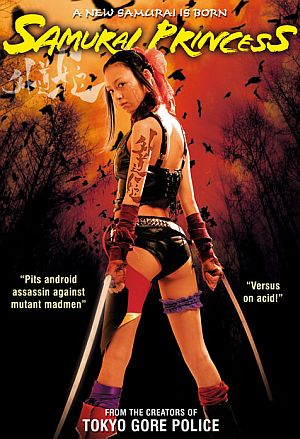★★½
“Whoever knew arterial spray could be so…dull?”
 Ok, “dull” is perhaps not quite the word, but Chris voted on this one with her closed eyelids and heavy breathing, and I was struggling to avoid joining her, despite some impressive ideas. It’s set in the Forest of Infinity, a strange locale where past, present and future all seem to merge. Hence, you’ve got renegades with samurai swords and Buddhist nuns and a party of a dozen young women whose paths cross with the former, resulting in the rape and death of 11. The un-named survivor (Kishi) is rescued by a scientist who creates mecha – cyborgs – and he uses the organs of her friends as a core to rebuild her, with the nun adding their 11 souls. The new super-powered samurai princess goes after the killers, and then Red Dragon and Butterfly, who instigated the murders in the name of what they call “art.”
Ok, “dull” is perhaps not quite the word, but Chris voted on this one with her closed eyelids and heavy breathing, and I was struggling to avoid joining her, despite some impressive ideas. It’s set in the Forest of Infinity, a strange locale where past, present and future all seem to merge. Hence, you’ve got renegades with samurai swords and Buddhist nuns and a party of a dozen young women whose paths cross with the former, resulting in the rape and death of 11. The un-named survivor (Kishi) is rescued by a scientist who creates mecha – cyborgs – and he uses the organs of her friends as a core to rebuild her, with the nun adding their 11 souls. The new super-powered samurai princess goes after the killers, and then Red Dragon and Butterfly, who instigated the murders in the name of what they call “art.”
It’s not as good as it sounds. I think it’s a lesson that gore, no matter how impressive, does not make a “good” film, because plot and characters still matter. That’s where this falls down, with too many scenes between the blood-letting that fail to go anywhere. It’s a huge letdown, especially after a undeniably spectacular opening ten minutes, highlighted by the heroine turning her breasts into a sort of ‘flying guillotine’ device that she shoots out on a chain and… Well, you gotta see it. [And, since the whole thing is now legally available through Youtube, feel free to do so. We’ll wait here.] But beyond that, the script wanders off on tangents, like the two female detectives apparently hunting mecha builders, with muddied motivation for a lot of the characters and performances which, too often, rely on pulling faces in place of acting.
It’s a shame, as I liked the concepts, underexplained as they were – is the Forest of Infinity anywhere near Versus‘s Forest of Resurrection? – and the fusion of elements from different periods. However, it felt as if the makers concentrated all their efforts on the gore effects, and that will only work if your entire running-time is composed of these. Though at times it felt like this was the case here, it wasn’t so, and the makers could learn from other, better entries on matters like pacing and characterization.
Dir: Kengo Kaji
Star: Aino Kishi, Dai Mizuno, Asuka Kataoka, Mitsuru Karahashi




